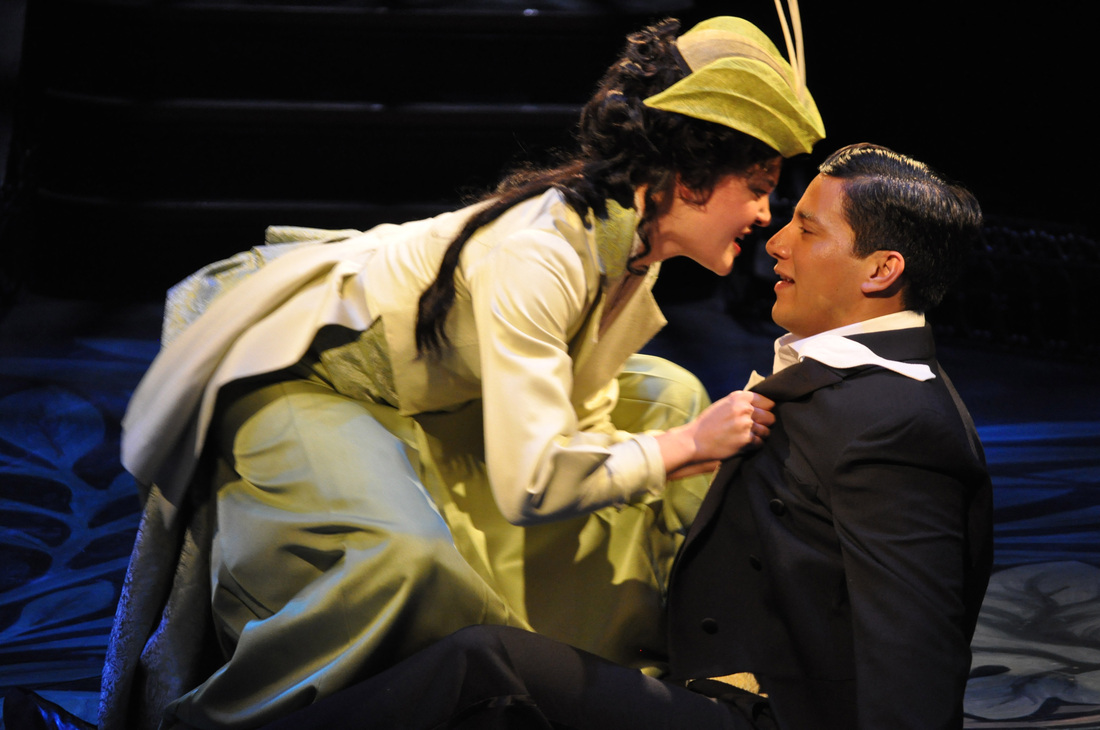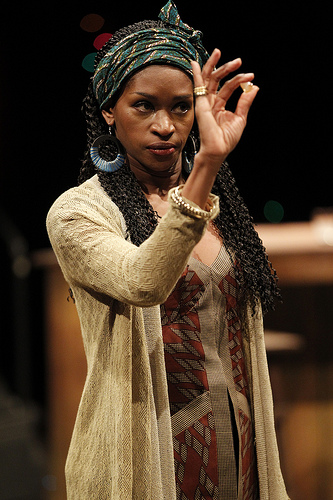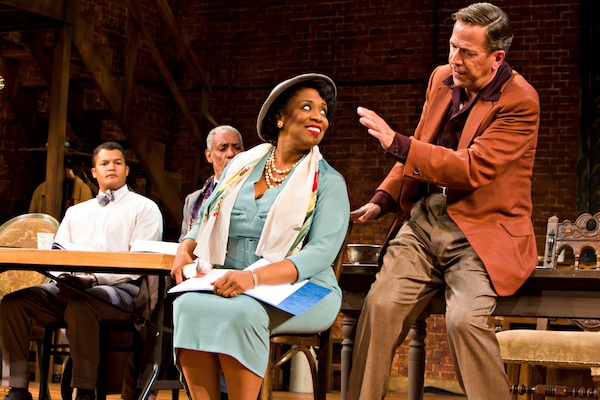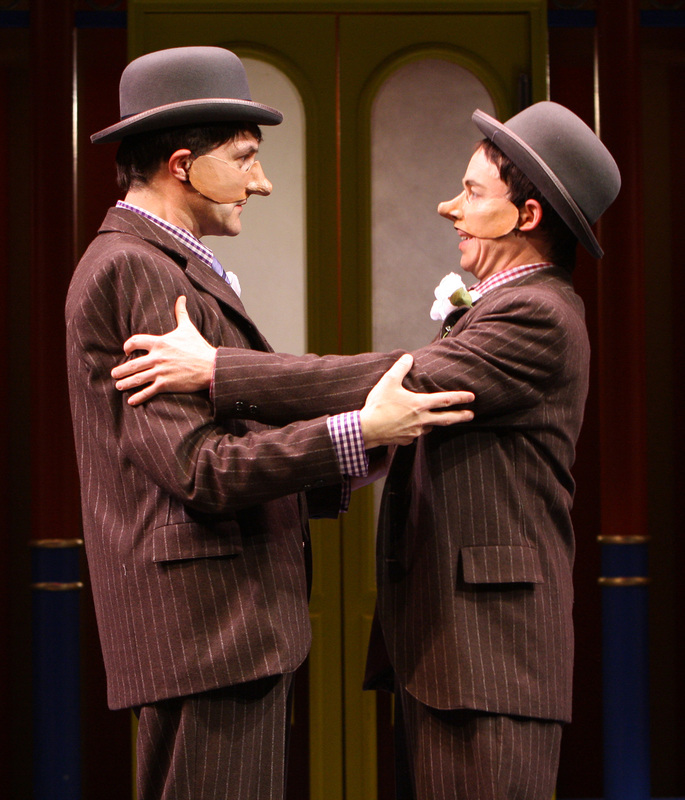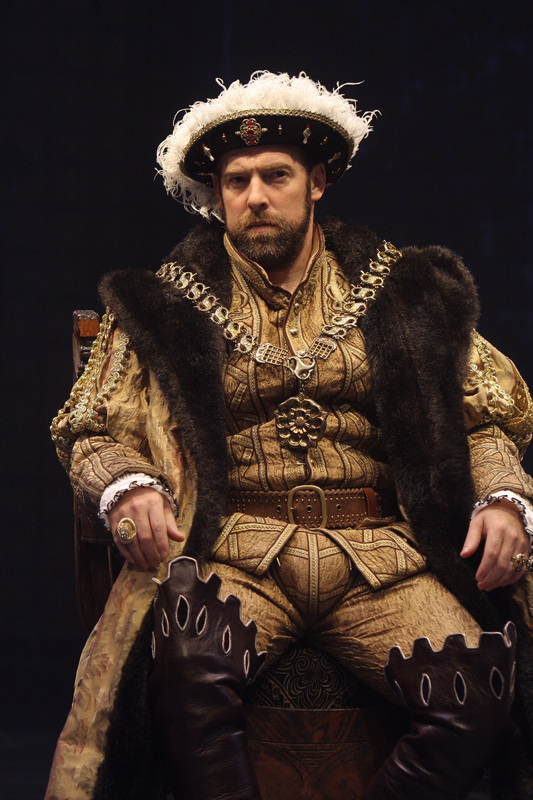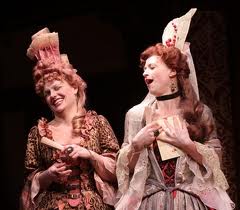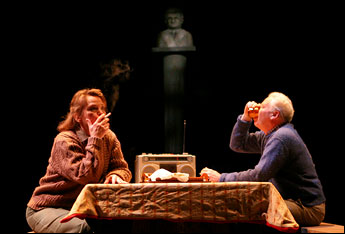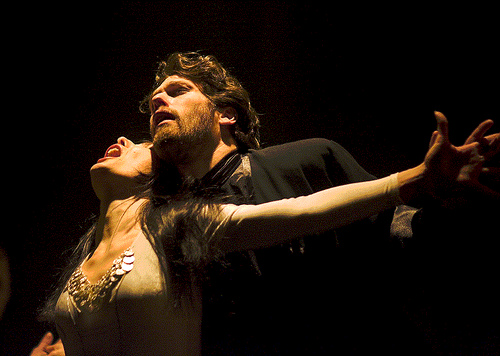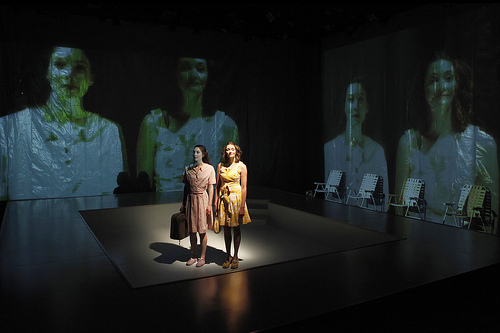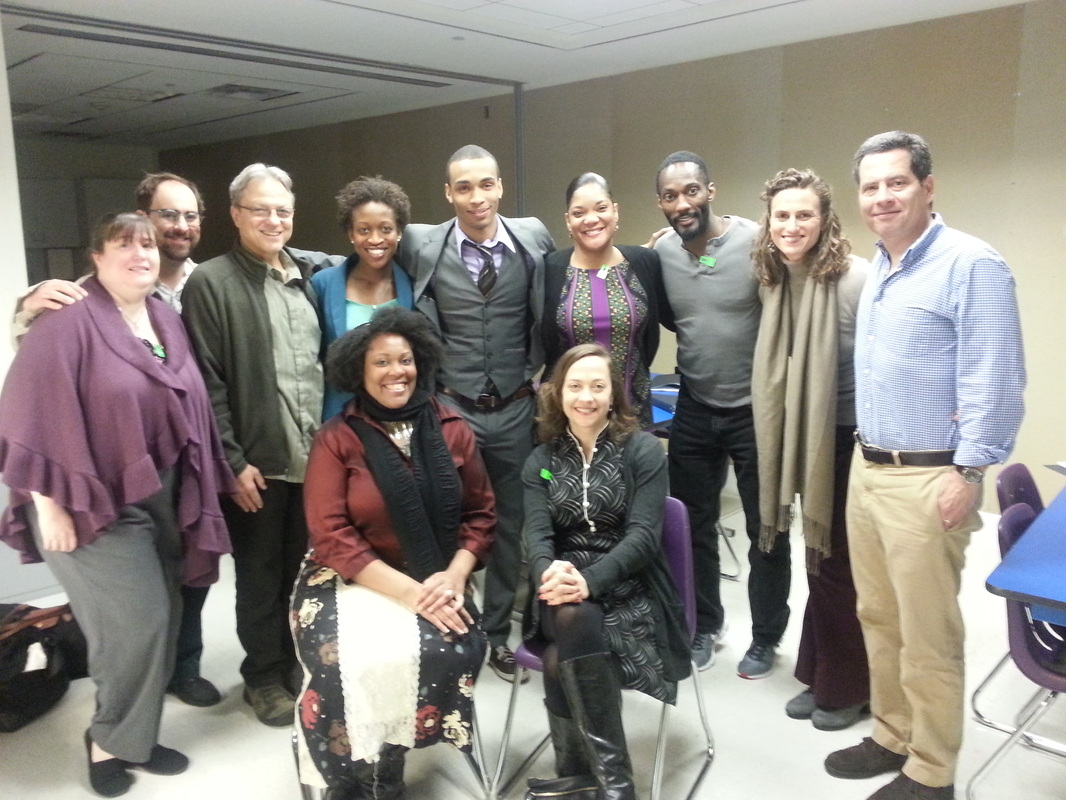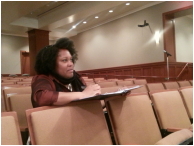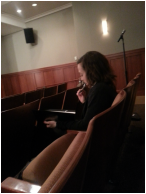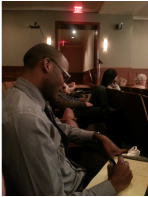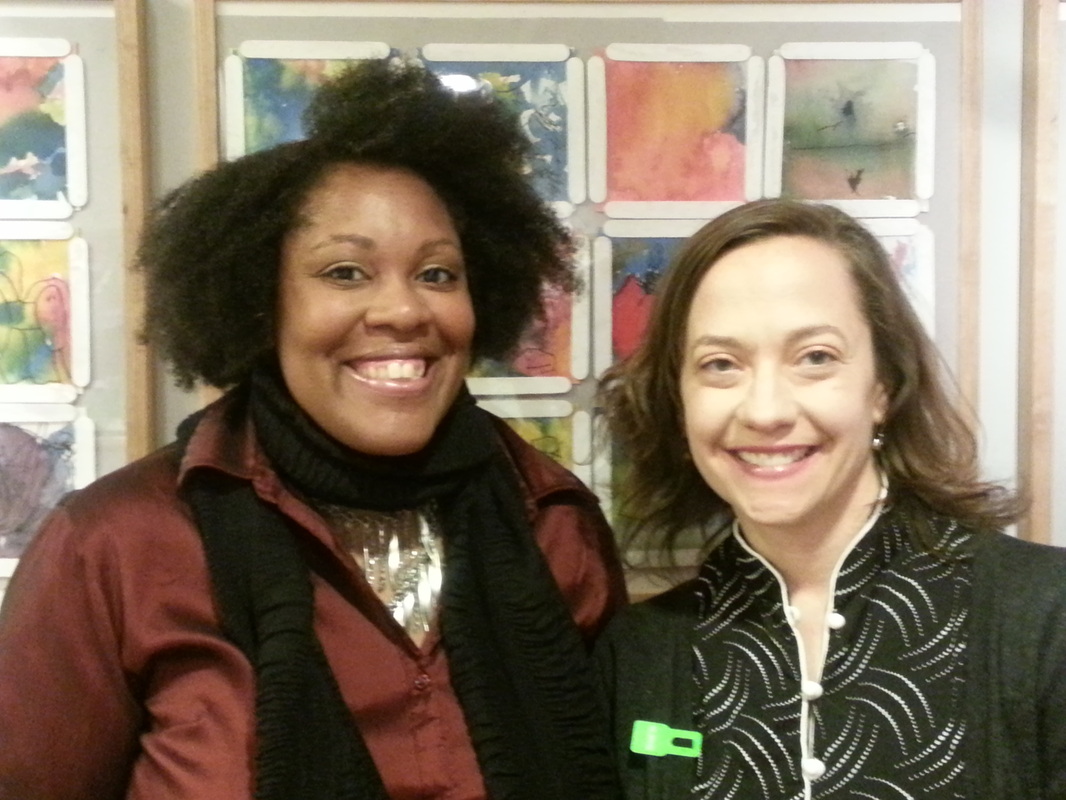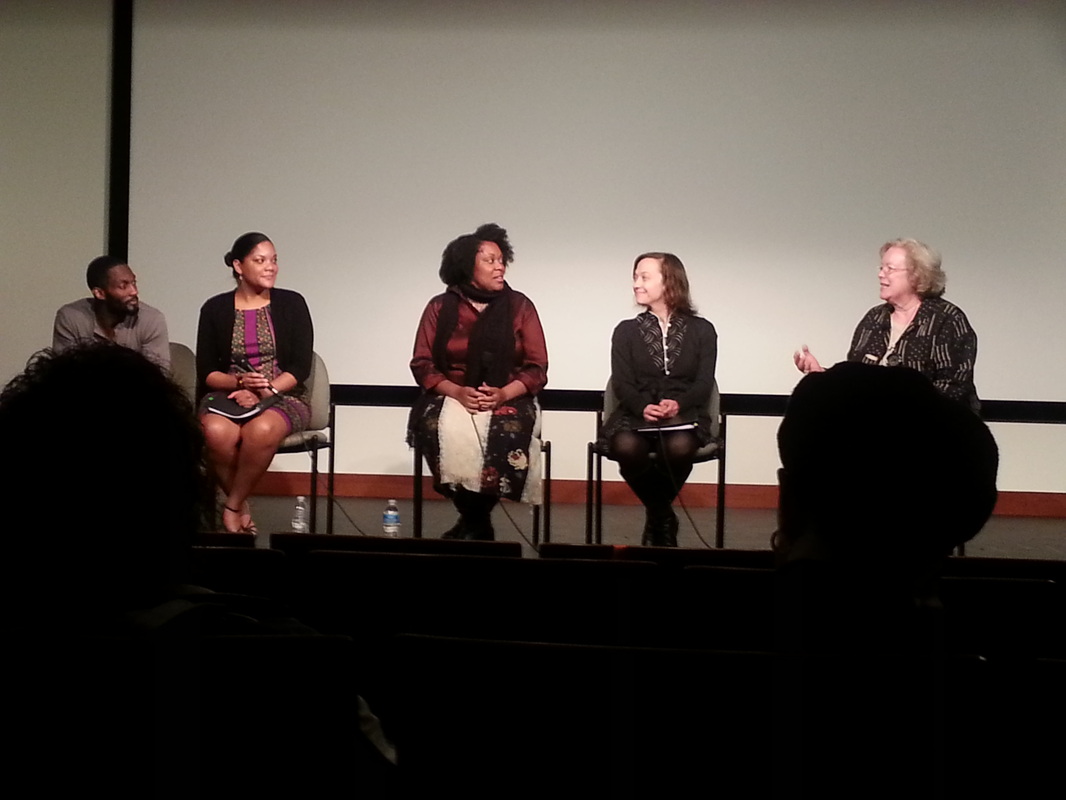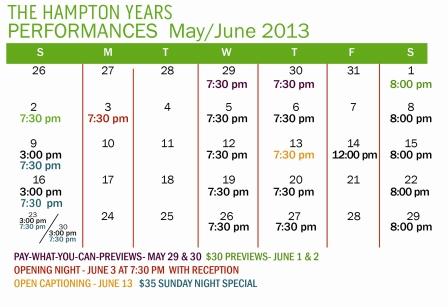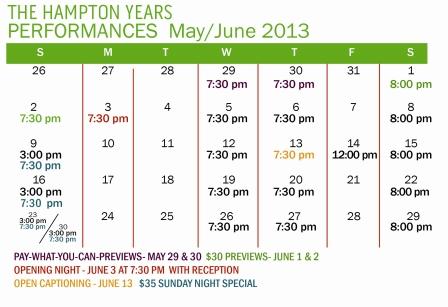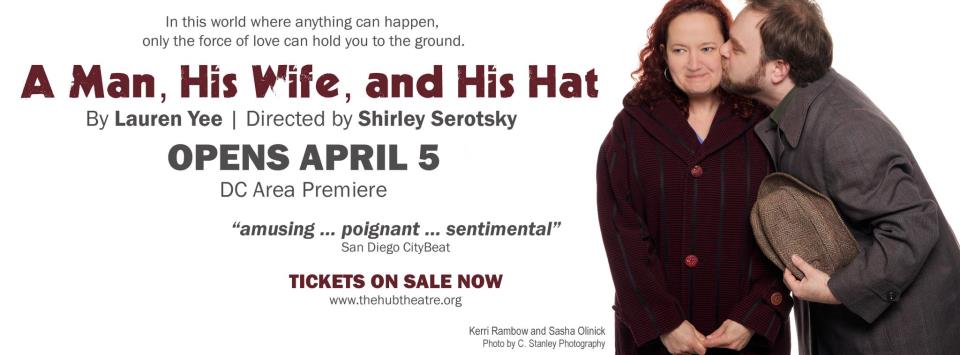|
JACQUELINE LAWTON: Why did you decide to get into theatre? Was there someone or a particular show that inspired you?
AMRITA RAMANAN: When I began high school, I focused primarily on math and science with the goal of becoming a doctor. During my sophomore year I learned that I needed to add another elective to my plate and theater was the only class that fit my schedule at the time. After three months, I was amazed at how theatre functioned as a transformative platform to share stories, evoke debates, and create empathy. It shifted my viewpoint of the world, emphasizing subjectivity over objectivity. From there, I was hooked and became one less pre-med student in the Indian community (sorry, Amma and Appa!). JL: How do you define dramaturgy? Or explain to people the work that you do? AR: Dramaturgy is the process of shaping the story – whether it is the story within a piece of theater or the story of a theater company. As Artistic Associate/Literary Manager at Arena Stage, my mission is to support the director, playwright, cast and creative team in the rehearsal room by offering questions and support for whatever needs best serve the artistic process – ranging from historical and topical research, responses to the progress of the script or production, and brainstorming how best to engage and invite with the audience and community into the world of the piece. In addition, I support Artistic Director Molly Smith and Director of Artistic Programming David Snider in shaping the storytelling of Arena Stage’s artistic programming by participating in season planning conversations and maintaining Arena Stage’s vision and mission – it’s ‘thru line’ –moving forward. JL: How long have you lived and worked as a dramaturg in DC? What brought you here? Why have you stayed? AR: I’ve been working in the Artistic Development department at Arena for five years – a fact that seems a bit surreal every time I mention it! I grew up in Las Vegas, so the desire to move to an environment that I perceived as the polar opposite of my hometown was dually appealing and terrifying. D.C. is such a rare city in that it’s simultaneously transient and intimate. I am fascinated by the rich interconnectedness of the artists and audiences who live here fused with the constant change of the city’s population and political identity every four to eight years. In addition, the people I’ve connected with here are always eager to feed their cultural appetites, making it a dramaturg’s playground in terms of who you interact with and the libraries, archives, cultural organizations and museums at your doorstep. JL: What skills and traits do you feel a successful dramaturg should have to support the development of a new play or a production? AR: Openness, a desire for innovation, and compassion. JL: What is the greatest part of being a dramaturg? What has been your most difficult challenge? AR: For me, nothing can compare to witnessing the birthing process of an idea and following its journey. I’m currently working with the incredible Tazewell Thompson on a new play Arena commissioned 12 years ago that I have been engaged with ever since I became an Allen Lee Hughes Literary Fellow in 2008. Even though the piece began well before I came to Arena, I’ve had the rare privilege of watching it change and grow, as well as developing a strong relationship with Tazewell through our relationship to the play. In terms of challenges, I think the role of the dramaturg is often stigmatized due to conflicting ideas about the function and ownership of practicing dramaturgy. I was once told by a playwright that they thought dramaturgs were “the police force” of the theatre, intentionally trying to monitor a playwright’s every move and beat them into submission. This story really troubled me as it put the dramaturg into the role of the aggressor as opposed to the advocate or collaborator. It is my belief that the dramaturgy for an artistic process should be owned by every collaborator in the room and that the dramaturg in support of this. Viewing the dramaturg as the police force is a harsh stereotype that needs to be overcome, but luckily I see more and more positive examples of healthy and sustainable dramaturgical collaborations every day. JL: Who are your favorite playwrights? What is it about their work that inspires or draws you to them? AR: There are so many writers that I deeply admire and have a tendency to devour their plays on the spot. I love the work of Marcus Gardley, Bill Cain, Lydia Diamond, Rajiv Joseph, Alice Childress, Ayad Akhtar, and Young Jean Lee – all of whom have challenged me, moved me, transported me to different worlds, and ultimately left a lasting imprint of their work on me. JL: DC audiences are ... AR: inquisitive, intelligent, and devoted JL: DC actors, designers and directors are... AR: brilliant, imaginative, and collaborative JL: DC playwrights are … AR: deft, passionate, and expansive JL: DC critics are ... AR: unapologetic, daring, and thoughtful JL: How do you feel the DC theatre community has addressed the issues of race and gender parity? How has this particular issue impacted you and your ability to get your work produced on the main stages? AR: Great strides have been made for more diversity and inclusivity throughout the DC theatre community, but as Wiletta Mayer says in Alice Childress’ Trouble in Mind, “We have to go further and do better.” I’ve been very proud of the shows Arena Stage, Woolly Mammoth Theater Company, Studio Theater, Forum Theater, Theater J and many others have championed on their stages that represent diversity both through the artists involved and content of the work, but until the work represented on stage reflects our burgeoning racial, ethnic, gender and cultural diversity throughout the world, we can’t rest on our laurels. JL: What advice do you have for an up and coming DC based dramaturg who has just moved to D.C.? AR: See as much art as possible and don’t be afraid to connect with artists whose work draws you in. There’s a bevy of wonderful opportunities in this city and artists ready to engage and add more collaborators to their artistic family. If you find an artist you want to work with and learn from, ask them out for coffee and watch the relationship grow from there. JL: What's next for you? Where can we keep up with your work? AR: So after six life-altering years in D.C., I'm saying goodbye (for now) and venturing into the next chapter of the book of life. First, heading to India on April 1st to explore the practices and methodologies of various theatre artists and troupes through support from the India Foundation for the Arts (and enjoying the perks of seeing my incredibly family and advancing my yoga and dance training while I'm there). Then, I’ll be serving as a co-collaborator with Double Edge Theatre on their summer spectacle, A Thousand and One Nights. I’ll miss ya, D.C., but this won’t be the end! Follow me on Facebook and stay in touch!
0 Comments
JACQUELINE LAWTON: Why did you decide to get into theatre? Was there someone or a particular show that inspired you?
MICHELE OSHEROW: I always loved theatre and tried a variety of theatre jobs in my younger days: acting, designing, marketing—you name it—before heading to grad school for English lit. I think seeing Peter Shaffer’s Amadeus when I was a kid (YES, with Tim Curry and Ian McKellen) had me hooked for life. I also saw my first Shakespeare play at the Edinburgh Festival that same year so my brain was probably hard-wired to classics of some kind or another. JL: How do you define dramaturgy? Or explain to people the work that you do? MO: I still haven’t found a definition of dramaturgy that I swear by probably because the work so often depends on the specific project or the needs of a particular director, production team or cast. I’ll explain my work to folks by saying I’m “the scholar in the rehearsal room” (though that looks really pretentious)—someone who works on text and concept with the director and fields questions from artists and actors. I describe my aim to infuse a production with a kind of intellectual energy. I work largely on Shakespeare productions, so I think folks understand the link to scholarship. I also explain that once in the rehearsal room, I try to be a pair of eyes for the person who does not know the play: I attend to clarity of storyline, tracking plot, that sort of thing. It all has to make sense in the end. JL: How long have you lived and worked as a dramaturg in DC? What brought you here? Why have you stayed? MO: I came to the D.C. area for grad school a bazillion (22?) years ago. At that time one of my professors told me to “get serious about Shakespeare and stop doing theatre.” I tried that, but Shakespeare completely separated from theatre felt wrong and distinguishing between my literary studies from what I thought might occur on stage made less and less sense to me; I thought there had to be a way to merge professional theatre and scholarship. I started working at the Folger about 11 years ago—resident dramaturg for the last five years. JL: If your work as a dramaturg doesn’t pay the bills, what else do you do? How do you balance this work with your dramaturgy? MO: I’m an Associate Professor of English at UMBC (University of Maryland, Baltimore County). It’s a terrific institution for creative and scholarly research and has been very supportive of my theatre work. I take advantage of the ‘in’ and try and involve my students in Folger offerings as best I can. Balance? I sure haven’t found it—the guilt of not having written that next book is always there. I also have a fantastically generous husband who doesn’t sulk about my time at the theatre; my children do (though they love attending the productions and meeting the artists). JL: What skills and traits do you feel a successful dramaturg should have to support the development of a new play or a production? MO: I’ve only worked on a few new plays and it’s been thrilling; living playwrights are more exuberant than dead ones. I think the most important skills for a dramaturg on any project are an open mind and insatiable intellectual curiosity. And—this may sound strange coming from an academic--I think it’s helpful to know when to try to inspire feeling over thinking. JL: What is the greatest part of being a dramaturg? What has been your most difficult challenge? MO: There are too many great parts to name! I’m pretty wild about Shakespeare and seeing others respond to his work gives me a genuine thrill—corny, but so it goes. Making the humor work, making people feel something with the same language to which audiences responded hundreds of years back leaves me feeling very ‘connected’ to the human experience. And fostering human connection is one of the things theatre does so beautifully. And then there’s Shakespeare’s language: the poetry, the precision. It all works. To hear it time and again from the mouths of talented actors is one of those gifts I give myself. I love all the possibilities the plays hold, and while I know choices must be made for each production, I get inspired arguing points or choices with directors—challenging them. I don’t need to win those arguments (though it’s a mighty fine day when I do), I just want to recognize and, yes, celebrate the complexities that are in every play. I appreciate how many ‘rights’ there are with Shakespeare and how these stories still work to help us understand our world. Most difficult (and rewarding) challenge? That’s an easy one: Shakespeare’s Henry VIII, directed by Robert Richmond in fall, 2010. That’s a very difficult play. HUGELY difficult. The whole team wrestled with it and the result simply dazzled me. AND the run was extended! For H8! Incredible! JL: Who are your favorite playwrights? What is it about their work that inspires or draws you to them? MO: Well, sigh, Shakespeare’s my favorite. He just gets human nature (for better and worse) and is so good at showing us our secrets. I love the poetry and meta-theatricality with which he’s always playing. I must have read Hamlet 500 times by now and just when I think “this time I won’t see anything new”, Shakespeare always wins. The lesser-read/staged plays like Measure for Measure, Troilus and Cressida, and Cymbeline really attract me and have been a bit of an obsession in recent years. Shakespeare makes me think and feel—deeply and constantly. I am more than lucky that I’m able to engage professionally with these texts. Newer works: I like the rawness of Conor MacPherson and Neil LaBute. I love Suzan Lori Parks’s plays and the theatricality of them. I think Michael Hollinger is smart, watchful and funny and I’m a great fan of Anne Washburn as well—her revamped Orestes remains one of my favorite Folger projects. JL: DC audiences are ... MO: intelligent, generous, engaged. JL: DC actors, designers and directors are .. MO: wickedly smart, creative, thoughtful, fearless. JL: DC playwrights are … MO: becoming more and more celebrated, which is wonderful! JL: DC critics are ... MO: shrewd. JL: How do you feel the DC theatre community has addressed the issues of race and gender parity? How has this particular issue impacted you and your ability to get your work produced on the main stages? MO: I’m very aware of how few directors I’ve worked with are women and/or people of color—there have been some, but not many. It’s a better picture in terms of the pool of designers and actors. I will hear from friends and patrons when there’s a cast without a person of color or very few women’s names listed on a production team. JL: What advice do you have for an up and coming DC based dramaturg who has just moved to D.C.? MO: See a lot of theatre; speak to the great folks behind D.C. theatres and get involved with the projects you’re keen to work on… I’ve had students who’ve volunteered their services to get their feet in theatre doors and it has worked. (But don’t quit your day job just yet.) JL: What's next for you? Where can we keep up with your work? MO: We've just closed Henry 5- and are currently rehearsing Twelfth Night. Next season has just been announced and I'm very excited about it-- we've already begun the work! JACQUELINE LAWTON: Why did you decide to get into theatre? Was there someone or a particular show that inspired you?
HANNAH HESSEL: I’ve been in theatre for longer than I can remember. I think I owe my interest to my older performer-of-a-sister and my very theatrically-educated parents for taking me to see Gilbert and Sullivan, Shakespeare and more during my childhood. Growing up in DC meant that having a theatrical education was easy. My first onstage experience came at Adventure Theatre summer camp, I grew up as a subscriber to the Shakespeare Theatre Company, and did summers there and at Theater Lab. JL: How do you define dramaturgy? Or explain to people the work that you do? HH: I think I say something different every time, or I laugh the question off. The problem is that it is different every time. With my full-time work at the Shakespeare Theatre Company I find ways to bridge and intensify connections between our audiences and our work. With Forum Theatre: I work to maintain our values of artistry, community and wonder. The work that I do with the Project Gym helps to artists to find sustainable creativity through collaboration and skill building. And I also work with individual artists to provide an extra creative eye or analysis on the work they are building. I fully believe all of that uses the skills of dramaturgy but I have no idea how I would fit them into a single job explanation. And I don’t know if they would accurately reflect any other dramaturg’s definition. JL: How long have you lived and worked as a dramaturg in DC? What brought you here? Why have you stayed? HH: Although a native of DC, I started working here professionally directly after finishing undergrad at Sarah Lawrence College. Beginning as an intern at Theater J, I stayed for five years combining my love of Jewish history and culture with my love of theater. At Theater J I grew as an artist and a dramaturg and in that time I also made strong connections with the larger DC arts community. I left for three years to pursue an MFA in Dramaturgy from Columbia University. Being in New York gave me the opportunity to see a tremendous amount of amazing work and meet a remarkable number of amazing artists. The time energized me for moving back to the district. I hope to stay and be a part of making DC as vibrant of an arts and theater community as possible. JL: If your work as a dramaturg doesn’t pay the bills, what else do you do? How do you balance this work with your dramaturgy? HH: I’ve been extremely lucky to make a living through dramaturgy my entire professional career. However, like many people in this field that living is small and my time is divided between many different programs. In addition to my full time job (40+ hours a week), I put in a couple hours a week towards Forum Theatre and about 15 hours a week into my fledgling company The Project Gym. It’s a busy and sometimes maddening life but I love it all. JL: What skills and traits do you feel a successful dramaturg should have to support the development of a new play or a production? HH: So many but here are a few…
JL: What is the greatest part of being a dramaturg? What has been your most difficult challenge? HH: The greatest part is being able to interact and be inspired by a wide range of artists. The most difficult part is the frustration of being in a field that hasn’t figured out how to articulate its relevance to the culture at large. Because of this, issues of mismanagement and lack of forward thinking, our field feels like it’s lagging behind both artistically and financially. I know there are many people working to counter this, so I refuse to give up hope that someday theater can be an important part of all citizens’ lives. JL: Who are your favorite playwrights? What is it about their work that inspires or draws you to them? HH: There are many generative artists who I’m drawn to by their passion, aesthetic and refusal to answer all the questions. The list would be long so here are three very different writers whose work I keep returning to: Caryl Churchill always challenges me and I love that she considers how the structure affects the storytelling. In doing so, each play is crafted into its own unique experience. Tennessee Williams will always be a favorite of mine. I started reading, and sobbing, over his work at a young age and still his stories of desperation and longing for connection touch me to my core. And DC’s very own Stephen Spotswood, because I’d feel terrible if I didn’t mention our local folks. Stephen’s work, in addition to tackling interesting and complicated topics, always impresses me with its use of language and rhythm. JL: DC audiences are ... HH: So incredibly smart. Don’t try to pull anything over on our audiences, it won’t work. JL: DC actors, designers and directors are .. HH: Eager to collaborate. I’ve been overwhelmed by the interest in the Project Gym from all sectors of the DC theater community. People want to come together, learn from and be inspired by each other. JL: DC playwrights are … HH: Hungry. Over the past few years, I’ve been amazed how much stronger the playwrighting community has become and despite increased opportunities it is never enough to feed them. It’s an exciting place to be, and I hope more opportunities will rise. JL: DC critics are ... HH: This is a hard one. I think all our critics mean well and want a successful community. I sometimes get sad about the current state of arts criticism both in terms of opportunity and professionalism, but that’s a longer story. JL: How do you feel the DC theatre community has addressed the issues of race and gender parity? How has this particular issue impacted you and your ability to get your work produced on the main stages? HH: We are lucky in this city to have some strong personalities who will always stand up for what is just and right. We are a city that doesn’t back down from arguments. I love this about DC. We haven’t reached any amount of parity. I will say some theaters are doing better than others; they keep it at the front of conversations and try to incorporate it in decision making. One of the things that I love about Forum Theatre is that we want to have the conversation. We noticed a problem within our own season and addressed it. Beyond addressing it, we pulled together members from the community to talk specifically about issues facing female playwrights. And we are currently discussing the best time to have a similar conversation about race. These are conversations that NEED to happen, and keep happening until there is no longer an issue. JL: What advice do you have for an up and coming DC based dramaturg who has just moved to D.C.? HH: Find kindred spirits. Have a group of artists that you always love talking to and working with. Have friends outside of theater. Read. Talk. See. (Attend Project Gym) Don’t put yourself in a box by what someone has told you dramaturgy is. Use your tools how you see fit. JL: What's next for you? Where can we keep up with your work? HH: In the next few months I’ll be leading a number of discussions at STC including a symposium about our productions of Shakespeare’s Coriolanus and Schiller’s Wallenstein (adapted by poet Robert Pinsky, who will be in attendance) on Sunday, April 28. The plays are complicated and feel very urgent given the current state of our military. And if you work in the Penn Quarter area you should come to the weekly performance series I curate, Happenings at the Harman! At Forum I will be working on Clementine in the Lower Nine and our upcoming Natsu Power’s directed devised piece that will go up in the summer. You can find out more about Project Gym at theprojectgym.wordpress.com. You can follow me on twitter: @hanvnah Oh, and I’m planning a wedding, so there’s that. 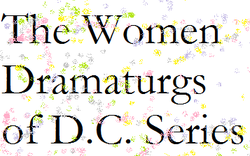 Welcome to the Women Dramaturgs of D.C. Series! Over the next few days, you'll be introduced to an extraordinary group of women working in the American Theatre as freelance and resident dramaturgs, literary managers, and directors of new play development. You'll find these women in the rehearsal halls of local, regional, and national theatre. And I hold each and every one of them the highest esteem. While there is no one way to define the role of a dramaturg, the Literary Managers and Dramaturgs of Americas has an excellent definition and informative list of duties here. My favorite parts of dramaturgy have to do with working with playwrights on new plays; speaking to audiences about a production and the process of bringing a play to the stage; teaching young people about how complicated ideas and different worlds can be explored through theatre; and bringing together the world of the play in the form of cultural and historical research. Now, as with my previous series on Playwrights, Directors and Artistic Directors, it is my hope that these interviews will serve others who are making their way as dramaturgs in the Nation's Capital, and beyond. And as all of you playwrights and directors begin to work on new plays this season, please consider reaching out one of these amazing, smart, talented, and hardworking women dramaturgs. 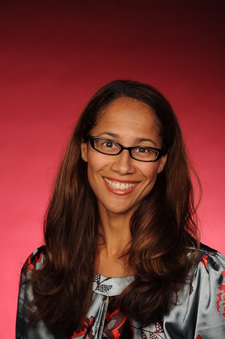 FAEDRA CHATARD CARPENTER Faedra Chatard Carenter (B.A., Spelman College; M.A. Washington University; Ph.D. Stanford University) is an assistant professor of theater and performance studies at the University of Maryland, College Park and a freelance dramaturg. A former resident dramaturg for Arena Stage in D.C. and Crossroads Theatre Company in New Jersey, Dr. Carpenter has also worked as a professional dramaturg for Centerstage, The John F. Kennedy Center for the Performing Arts, the African Continuum Theatre Company, Theater J, Black Women Playwrights, and TheatreWorks. Carpenter is an Advisory Editor in Drama for Callaloo, an Editorial Board Member for The Southern Quarterly, and is on the Board of Directors for Literary Managers and Dramaturgs of the Americas (LMDA). Her scholarly interests include the study of race, sexuality, and gender in contemporary performance and her work is published in Review: The Journal of Dramaturgy; Theatre Topics; Women & Performance; Text and Performance Quarterly; and Callaloo. 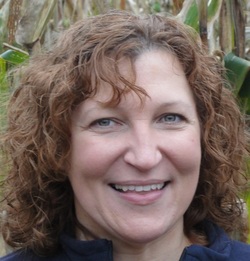 ANN-MARIE DITTMANN Ann-Marie Dittmann works as a Library Associate at the Arlington Public Library where she plans and facilitates a wide variety of adult programs including theater and dance performances, feature and documentary film series, and author talks. She also curate, Down Stage Center, is a meet-the-artist series featuring theater artists in the metro DC area, with a concentrated focus on those in Arlington County. Recent professional theater activities include: Production Dramaturg, Chess and Sunset Boulevard, Signature Theater (Arlington, VA); Since January 2011 I have served as a Helen Hayes Awards Judge for Theater Washington. Additional volunteer activities have included sitting on the grant review panel for the Arlington Community Foundation’s Community Enhancement Grants for the Arts and Humanities. Previous dramaturgical positions have included serving as the Audience Enrichment Manager at Arena Stage and Literary Assistant at Goodspeed Musicals. 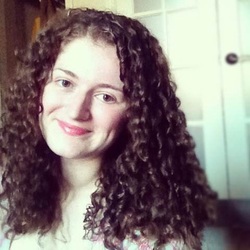 LAUREN HALVORSEN Lauren Halvorsen is the Literary Associate at The Studio Theatre, where her dramaturgy credits include The Motherfucker with the Hat, The Aliens, Bachelorette, The Big Meal, and Time Stands Still. Previously, she spent three seasons as Literary Manager of the Alley Theatre in Houston, TX. Lauren is also an Artistic Associate with WordBRIDGE Playwrights Laboratory, where she facilitated the development of 38 plays over a five-year period. She has worked in various artistic capacities for City Theatre Company, Eugene O’Neill Theater Center, First Person Arts Festival, and The Wilma Theater. Lauren is a graduate of Bryn Mawr College. 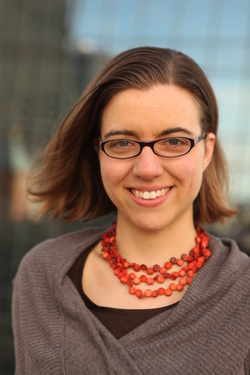 ADRIEN-ALICE HANSEL Adrien-Alice Hansel is Literary Director at The Studio Theatre, where she oversees the expansion of their new play and international programming and new audience engagement initiatives. At Studio, she has dramaturged An Iliad, Dirt,Invisible Man, Sucker Punch, The Golden Dragon, Lungs, The History of Kisses and The New Electric Ballroom, among others. Previous to joining Studio, she spent eight seasons at the Actors Theatre of Louisville, where she headed the literary department and coordinated project scouting, selection, and development for the Humana Festival of New American Plays. She also served as production dramaturg on roughly 50 new, contemporary, and classic plays. Her production work at Actors includes commissions Gina Gionfriddo’s Becky Shaw (2009 Pulitzer finalist), Naomi Wallace’sThe Hard Weather Boating Party, Jordan Harrison’s Maple and Vine, and Craig Wright’s The Unseen, as well as premieres by Rinne Groff, Adam Bock, Charles Mee, Lisa Dillman, and John Belluso. Ms. Hansel also has extensive experience in developing projects with ensemble theatres, including The Method Gun with Kirk Lynn and Rude Mechs, This Beautiful Citywith The Civilians, Cabin Pressure with Anne Bogart and SITI Company and Batch with Alice Tuan and New Paradise Laboratories. She has also worked in the literary offices of Yale Repertory Theatre and Seattle Repertory Theatre, and has served on funding panels for the Joyce Foundation, McKnight Foundation, and Creative Capital’s MAP Fund, among others. She is the co-editor of eight anthologies of plays from Actors Theatre and three editions of plays through Studio Theatre. Ms. Hansel holds an M.F.A. from the Yale School of Drama. 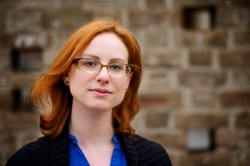 JENN BOOK HASELSWERDT Jenn Book Haselswerdt is a dramaturg, writer, and theatre education professional in the Washington, DC area. She is an Advising Dramaturg/Producer with The Inkwell, where recent dramaturgical work has included The Body (Steve Moulds, playwright), The Snake Charmer (Eric Loo, playwright), Terminals (David Robinson, playwright), Forgotten Kingdoms (Randy Baker, playwright), Where the Whangdoodle Sings (Kristopher Frithjof Peterson, playwright), Twigs & Bone (Tiffany Antone, playwright), and Crown of Shadows (formerly strive/seek/find, Jason Gray Platt, playwright). Dramaturgy with other area theatres includes TETHER (Doorway Arts Ensemble), Bleed and An Ordinary Afternoon (DAE’s Playground series), Off the Block (Active Cultures), Eulogy (Imagination Stage), and Sing and Never Tire (KUUMBA Players). Jenn received her MA in theatre history and criticism, dramaturgy focus, from The Catholic University of America. She has been the Education Program Manager at Imagination Stage (Bethesda, MD) since 2007, where she has had the opportunity to teach creative drama and music, as well as write plays for young actors. Jenn has also taught with C2 Educational Centers and the DCJCC. Jenn lives in Silver Spring with her husband, their son, their cat, and their turtle. 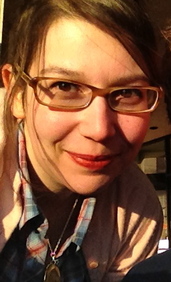 HANNAH J. HESSEL Hannah J. Hessel is the Founder and a Creative Trainer at the Project Gym, a space for creative development. She spends her days as the Audience Enrichment Manager at the Shakespeare Theatre Company. At STC, she runs the Creative Conversations discussion series which includes a range of discussion formats including the innovative Twitter Night providing an online conversation before and after a performance. She also oversees the free weekly performance series Happenings at the Harman. Outside of STC, she serves as the Senior Dramaturg at Forum Theatre. She was the Literary Director, Outreach and Education Associate at Theater J. She serves on the board of the Association of Jewish Theater. A graduate of Sarah Lawrence College, she holds an MFA in dramaturgy from Columbia University. 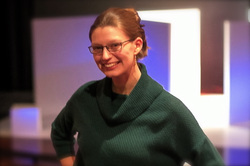 TAYLOR LEE HITAFFER Taylor Lee Hitaffer is a Washington, DC based freelance dramaturg and arts administrator. Educated in Theatre Studies from Towson University, Taylor has served as dramaturg for some of the District's finest nonprofit performing arts organizations, including Constellation Theatre Company, Theater J and The John F. Kennedy Center for the Performing Arts. She is an advising script reader and core dramaturg for The Inkwell, DC's premiere resource for new play development. Currently, Taylor is the Program Assistant for the Kennedy Center American College Theater Festival, where she's spent the last four seasons coordinating the KCACTF National Festival, the MFA Playwrights' Workshop and the New Play Dramaturgy Intensive. Taylor is a proud member of Literary Managers and Dramaturgs of the Americas, Theatre Communications Group, Write Local. Play Global. and The Playwrights' Center. 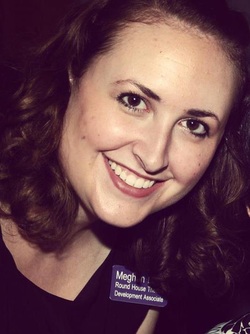 MEGHAN LONG Meghan Long is a theatrical producer, manager, dramaturg, and arts administrator. She recently moved from D.C. to New York in July 2012 to pursue an MFA in Theatre Management and Producing at Columbia University’s School of the Arts. During her time at the School of the Arts, she has associate produced No Boundaries: New Short Play Festival and is currently associate producing Paulina Barros’ thesis production of THE COMFORT OF NUMBERS. Meghan is the producer for Junesong, a D.C.-based arts collective, which she co-founded with Timothy J. Guillot. With Junesong, she recently produced the premier of Timothy J. Guillot’s THE WEBCAM PLAY at the 2012 Capital Fringe Festival, and the premiere production of Timothy J. Guillot’s WE FIGHT WE DIE through the Mead Theatre Lab Program at Flashpoint. In addition to her work with Junesong, she is a Partner-in-Ink and seasoned dramaturg at The Inkwell. Meghan has worked on numerous Inkwell projects over the past three years, including two Inkreadings: Clarence Coo's BEAUTIFUL PROVINCE (BELLE PROVENCE), which was presented at the 2011 Bay Area Playwrights Festival and Henry Murray's MONKEY ADORED (98% HUMAN), which received a premiere production at Los Angeles' Rogue Machine in September 2011. Most recently, she was an Inkwell dramaturg for a showcase reading of Mariana King’s OFELIA’S LOVERS. Meghan has also worked administratively in many D.C.-area theaters, including Woolly Mammoth Theatre Company and Round House Theatre. 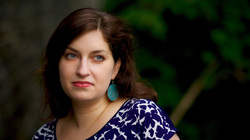 LAURA ESTI MILLER Laura Esti Miller is a dramaturg, literary manager, writer, and educator. She is the Literary Manager for Forum Theatre in Silver Spring, MD, and a Partner-in-Ink with The Inkwell, the resource for new play development in the nation's capital. Recently, she was named an associate member of Pinky Swear Productions in DC and her co-created devised dance-theatre piece, Mark Twain's Joan of Arc, was featured in Burning Coal Theatre's Politheatrics festival in Raleigh, NC. She has worked as a dramaturg, writer, or researcher for numerous productions along the East Coast including The Public Theater's 2007 production of Romeo and Juliet. Laura is the former Creative Development Director of the off-Broadway company Electric Pear Productions, and has had the honor of working with The Kennedy Center, Shakespeare's Globe Theatre, The Princess Grace Awards, Drama Dept, g14 productions, Rorschach Theatre, Urban Garden Performing Arts, Premiere Stages, Chesapeake Shakespeare Company, visual artists Sherrard Bostwick and Juliana Cope, and collaborating musically with the groups Casual Occupation and The Working Effective. She is a proud alumna of Brooklyn College and James Madison University. 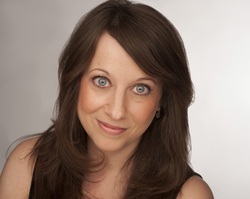 MICHELE OSHEROW Michele Osherow is Associate Professor of English and Affiliate Associate Professor of Judaic Studies at the University of Maryland, Baltimore County. She received her M.A. and Ph.D. in English Literature from the University of Maryland, College Park. Areas of specialization include Shakespeare and Renaissance Literature, Biblical Literature, Jewish American Literature, Dramatic Literature, and Women's Studies. At UMBC she has enjoyed collaborating with faculty in the departments of Theatre, Mathematics, Visual Arts, and the Imaging Research Center. Her experience in professional theatre includes serving as Resident Dramaturg at the Folger Theatre and serving on the Board of and performing for the Quotidian Theatre Company (most recently in Brian Friel’s Afterplay; summer, 2012). Publications include "Crafting Queens: Early Modern Readings of Esther," in Queens and Power in Early Modern Europe (Nebraska UP), "She is in the right: Biblical Maternity in All's Well that Ends Well" in Routledge's Accents on Shakespeare Series, and "'Give ear o' princes': Deborah, Elizabeth, and the Right Word," in Explorations in Renaissance Culture. Her book Biblical Women's Voices in Early Modern England was released by Ashgate Publishing Company in 2009. She is co-writing a text with theatre director Aaron Posner on staging Shakespeare, is co-editing an encyclopedia on Early Modern Englishwomen, Exemplary Lives and Memorable Acts, 1500-1650 (Ashgate) and is currently researching contemporary American productions of Shakespeare for the volume How We Make Shakespeare Mean, co-authored with Gary Waller (SUNY Purchase). Michele has served several times as Interim Executive Director of the Shakespeare Association of America. 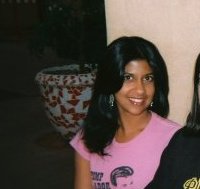 AMRITA RAMANAN is the Artistic Associate/Literary Manager at Arena Stage. Her production dramaturgy credits include Mary T. & Lizzy K., My Fair Lady, The Music Man, Trouble in Mind, Ruined, Duke Ellington’s Sophisticated Ladies and Crowns (Arena Stage); Skywriter (2009 Cap Fringe Festival); and Cymbeline (Great River Shakespeare Festival). Prior to her position as Artistic Associate/Literary Manager, Amrita was the New Play Producing Fellow and Dramaturgy Fellow with Arena Stage, the School Programs Intern at the Shakespeare Theatre Company, and wore a number of hats at the Great River Shakespeare Festival, where she worked in education, outreach, publicity and marketing during her four-season tenure. For two years, Amrita has served as an adjudicator for the D.C. Commission of Arts and Humanities Larry Neal Writer’s Competition and as a script reader for The Playwrights’ Center. A West Coast native, Amrita holds a B.F.A. in dramaturgy and theater history from the University of Arizona. 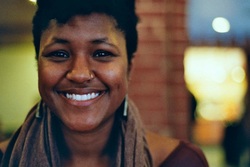 JAMILA REDDY Jamila Reddy is director, poet, dramaturg, and teaching artist. She is an alumna of the University of North Carolina at Chapel Hill, where she received BAs in Dramatic Art and Sociology. She directed several productions at the undergraduate level, including the premier of Kind of Blue, an original play by Kuamel Winston Stewart, and Ntozake Shange's For Colored Girls Who have Considered Suicide When the Rainbow is Enuf. For her contributions to the Department of Dramatic Art at UNC, Jamila received the Richard and Christopher Edward Adler Award for Excellence in Dramatic Art (2010) and the Louise Lamont Award for Excellence (2011). Jamila was a member of the 2008 Bull City National performance poetry slam team. She served as artistic director (2008-9) and two-term president (2009-11) of Ebony Readers Onyx Theatre, a spoken word/theatre performance ensemble at the University of North Carolina at Chapel Hill. Jamila served as the inaugural Artistic Apprentice at The Studio Theatre in Washington, DC where she assistant directed five main stage productions and worked in the literary department. She served as dramaturg for the workshop and staged reading of Danielle Mohlman's Stopgap, and directed the World Premier production at the 2012 Capital Fringe Festival. Jamila is currently living in Washington, D.C working as an Assistant Resident Director at The American University and serving as a Teaching Artist and Poetry Slam Team Coach for the Woodrow Wilson High School Slam Team with Split This Rock. Jamila recently worked as Dramaturg on David Mamet's Race at Theater J in February of 2013. 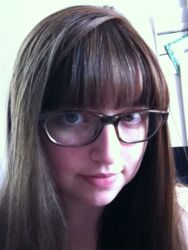 LARONIKA THOMAS LaRonika Thomas is a doctoral student in the Theatre and Performance Studies Department at the University of Maryland. She holds an MA in Theatre from Purdue University and a BA in Theatre and Anthropology from Indiana University, and also serves as adjunct faculty in the Theatre and Communications departments for the Community College of Baltimore County. Her research interests include cultural space and cultural policy, particularly in 21st century Chicago, site-specific performance, performance and identity, online archiving and databases in the new play world, and digital performance. LaRonika is currently the Vice President for Regional Activity for the Literary Managers & Dramaturgs of the Americas (LMDA), having previously served in several positions for the organization. She has worked in various capacities with the Goodman Theatre, the Public Theater, CenterStage, Chicago Shakespeare Theatre, Woolly Mammoth Theatre Company, The Playwright’s Center, Neo-Futurists, and Writers’ Theatre, among others. She has presented papers and chaired panels at several LMDA conferences and at ATHE, where she was elected to the one-year position of graduate student representative for the Dramaturgy Focus Group during the 2012 conference. LaRonika’s short play, J-Rots, was a finalist for the 2012 Heideman Award at the Actors Theatre of Louisville. She is a recipient of an LMDA residency grant as well as three Chicago City Arts Assistance Program Grants for her individual work. 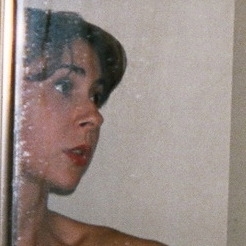 MIRIAM WEISFELD Miriam Weisfeld is the Director of Artistic Development at Woolly Mammoth, where she was lead producer of the 30th anniversary conference on Theatre, Democracy, and Engagement, and has dramaturged several world premieres including Anne Washburn’s MR. BURNS, David Adjmi’s STUNNING, Robert O’Hara’s ANTEBELLUM and BOOTYCANDY, and others. Additional credits include work for New York Theatre Workshop (projects with JoAnne Akalaitis, Ivo van Hove, and Universes); A.R.T. (with Robert Woodruff, Anne Bogart, and Paula Vogel); Two River Theatre/Folger Theatre (with Teller); Steppenwolf Theatre; Actors Theatre of Louisville; Lookingglass Theatre; and the Banff Playwrights Colony (upcoming). She has lectured on theatre at Harvard University, MIT, George Washington University, Suffolk University, Northwestern University, the Kennedy Center, and the Moscow Art Theatre School. She holds an MFA in Dramaturgy from the A.R.T./MXAT Institute at Harvard University. She is a contributing author to the next edition of the Routledge Companion to Dramaturgy. 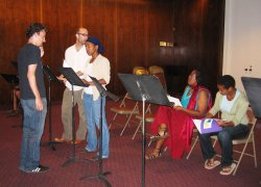 In December of 2004, I was living in Baltimore and had completed a brief stint at CENTERSTAGE. By January of 2005, I was working as a temp at Catholic Relief Services. For three weeks that winter, I walked to and from work; a total of three miles. I worked from 10:00am to 6:00pm. When I got I came home, I cooked dinner and wrote from 8:00pm to 11:00pm. I liked my work. I liked being in service to the greater good. I was working there during the Indian Ocean tsunami of 2004. I liked the stability of my schedule and the steady salary. So much so, that I considered shifting my life and career. But theatre had saved my life after a series of traumatic experiences (that I'll write about one day) and I knew I wasn't ready to leave it. And as much as I missed Austin and missed being surrounded by artists of various disciplines eager to work and create with together, I knew that moving back to Texas wasn't an option. Mainly, because I had spent a fortune getting to the East Coast. So, I kept plugging along. 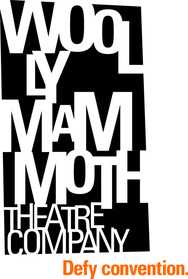 Towards the end of January, a dear friend sent me the notice for the Literary Internship at Woolly Mammoth Theatre Company. His message read: "Don't think about it, just apply. Don't try to figure it out, just apply. Don't freak out about all the reasons why it'll hard as hell to make work, just apply." So I did and by the grace of divine providence and all that is meant to be, I got the internship. Later, I learned that my boss, Mary Resing, who was then Woolly's Director of New Play Development, had gone to school with the brilliant and amazing Jill Dolan (one of my mentors, references and advocates). Mary figured that anyone who had successfully survived so many classes with Jill had to be smart, hardworking, talented and up for a challenge! And I was, ready for the challenge and eager to absorb everything! So, I went from a lovely mile and half walk to and from work to an exhaustive hour long train commute each way. I went from having a steady and decent income to making barely enough money to cover transportation and had to take a part-time at the Ford's Theatre box office to make rent each month. But I was happy. During those one hour train ride, I read the most amazing and adventurous plays and I met so many wonderful people while working at the Ford's Theatre. Also, I started writing a play, DEEP BELLY BEAUTIFUL. My time at Woolly Mammoth was amazing. The extensive training that I received and the actually professional opportunities given to me went above and beyond my expectations. I learned an approach to dramaturgy that works to serve the playwright's voice and vision. I learned how to ask questions about the playwrights' intention and writing process, which for me, is the first and most important part of the process. I learned how to bring the world of the play to life through research, music, food, photographs, geography, politics, and humor. I learned how to communicate the spirit of the production to the audience. And by working with such extraordinary playwrights as Gina Gionfriddo, Kirsten Greenidge, Sherry Shepard-Massat and Sarah Ruhl, I also learned how to be a better playwright. I completed my internship in August of 2005. From there, I went to work at the Folger Shakespeare Library, but I continued to work as a dramaturg. Eventually, I became resident dramaturg at Active Cultures and African Continuum Theater Company. I worked freelance at the Arden Theater (Philadelphia, PA), Discovery Theater, Ford's Theatre, Howard University, the Kennedy Center, Morgan State University, Redshift Productions (New York, NY), Rorschach Theater Company, Round House Theatre, Theater Alliance and Theatre of the First Amendment. My dramaturgy packets have been used at Ensemble Studio Theater (New York, NY), Interact Theatre (Philadelphia, PA), Theater J, Horizon Theatre (Atlanta, GA). It's been an exciting adventure! In the last two years, my focus has shifted to playwriting, but I truly miss my dramaturgy work. This is why I've been so excited to connect with the Women Dramaturgs of D.C. and present this series. In my next post, I'll introduce you to the women being featured and share their stories with you over the course of the next few days. I hope you'll enjoy learning about their lives and careers as much I as have. “It’s dangerous what you’re teaching these students. Self-expression, much good that’s going to do them. They’re Negroes. The world will only give them so much.” This speech appears in a new work of historical fiction by local playwright Jacqueline Lawton. Set in the 1940s, “The Hampton Years” follows artist/educator Viktor Lowenfeld as he struggles to establish an art department, over administrative opposition, at Hampton Institute. Lawton was originally drawn to the story, she says, by the intertwining dramas of Jews struggling to make a new life after the Holocaust and African American students struggling to make their way in the unwelcoming art world. “I knew I was writing about Margaret and Vicktor Lowenfeld rejecting Harvard and settling in Hampton, Virginia – such an isolated spot for Jews,” Lawton recalls. “And I knew I was writing about Viktor's stewarding the lives of these young artists,” muralist John Biggers (1924-2001) and sculptor Samella Sanders (now Lewis, b. 1924). “What I didn't know was how much of the story was about fighting for the arts,” Lawton continues. “I began to realize how hard Viktor had to work – he had to develop a curriculum and hire teachers and do everything a department chair has to do, but he also had to fight, every day, to prove that the arts are necessary.” Now, as a visiting professor in the midst of the University of the District of Columbia's reorganization, Lawton finds “life paralleling art.” Theatre Arts at UDC has two faculty members: Assistant Professor Lennie Smith, whose position was recently terminated, and Lawton, whose year-to-year position is now more tenuous than usual. Theatre majors find this “heartbreaking” and a “big disappointment.” They fear losing faculty they counted on for advice, recommendations, and networking; some say their tie to UDC “is severed,” and one notes “they pulled the rug out from under us.” Excerpted from "1940s Arts Drama Replays in 2013" by Virginia A. Spatz, originally published in East of the River Magazine. Click here to read the rest of the interview. 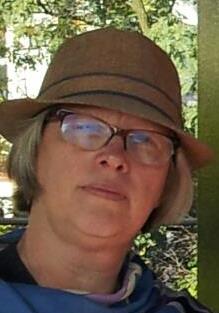 Virginia Avniel Spatz is a writer and activist in Washington, DC. She is feature reporter on the Education Town Hall and helps produce The Politics of Health, both on We Act Radio (WPWC 1480 AM), and often contributes to East of the River magazine. She blogs on Jewish topics at Song Every Day. 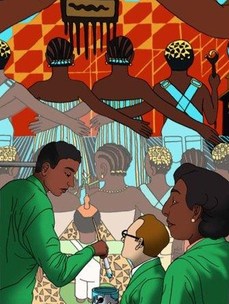 Yesterday's rehearsal and reading of The Hampton Years was rich, productive and rewarding. It was wonderful to be in the room with Shirley, Otis, Karen and our cast. We had a quick and dirty read through and exploration of the script. What's more, I was inspired to create a few new moments in our brief time together. This is what comes of working with smart and generous actors who make great, bold acting choices. Everyone at The Phillips Collection was warm and welcoming. They strongly believe in this play and were proud to have it as part of the series. Coincidentally, this was actually my second involvement with their theatre series. In 2010, Round House Theatre presented scenes from PERMANENT COLLECTION and as dramaturg, I provided them with research. We had a diverse, intimate and attentive audience. Among them were students from UDC and Howard University as well two graduates from Hampton University. Also, in attendance was George Vrandenburg, who in addition to serving as chairman of the board at The Phillips Collection, also serves on the Board of Trustees at UDC. We were introduced at intermission and immediately discussed the parallels between the events in the THE HAMPTON YEARS and what is happening at UDC. As it happens, this parallel is addressed in detail in a recent interview, 1940s Arts Drama Replays in 2013, that I did with Hill Rag/East of the River reporter Virginia Spatz. In it, Virginia does an excellent job covering what's at stake in the decision to discontinue the Theatre Art program from a variety of perspectives including that of the students, faculty, administration and D.C. council. 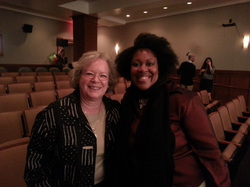 The post show discussion, led by the Phillips Collection's Director of Communication Ann Greer, was fun and informative. It was wonderful to hear from Hampton alum about their own experiences and really great to hear from working artists who were inspired by their life, careers and legacies of the artists portrayed in the play. Actors Lolita Marie and David Lamont Wilson also spoke eloquently and passionately about their experiences working on THE HAMPTON YEARS from the very beginning of the play's development. It was really all so great! As for what's next, we're at that exciting place in new play development process where we need to get the play on it's feet to see how it works in the body and on the stage. With rehearsal beginning in two weeks, we're all pretty eager to get started. I'll do another set of rewrites in the next few days and hope to make a visit out to Hampton University next week. More on that soon! For now, please enjoy this photos from our day together. The Hampton Years Family at The Phillips CollectionThe Hampton Years Artistic Team Hard at WorkPlaywright and Director Enjoying the Student Art Exhibit The Hampton Years Reading at The Phillips CollectionThe Hampton Years Post Show Discussion The Phillips Collection is an "intimate museum combined with an experiment station."–Duncan Phillips, 1926. The Phillips Collection is an exceptional collection of modern and contemporary art in a dynamic environment for collaboration, innovation, engagement with the world, scholarship, and new forms of public participation.
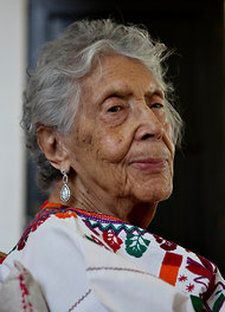 African American sculptor and print maker, Elizabeth Catlett was born in Washington, DC on April 15, 1915. She studied design, printmaking and drawing at Howard University and became the first student to receive a Master's degree in sculpture at the University of Iowa in 1940. In 1946 Catlett received a prestigious Rosenwald fellowship that allowed her to travel to Mexico City where she studied painting, sculpture and lithography. Later, she became a Mexican citizen. Most known for her politically charged black expressionist abstract sculpture in bronze and marble as well as prints and paintings, many of her works of art depicted the female figure and were greatly influenced by African American, Native American, and Mexican art. Elizabeth Catlett passed away last year on April 2nd. She was 96 years old and lived a long, full, rich, and complicated life. Having only just learned about her life and her work, my heart was broken when I got the news. I had wanted Elizabeth Catlett to know about the play and perhaps read it as Samella Lewis had. I wanted her to know that her work had resonated so deeply and profoundly with me, and that a play devoted to her life and legacy would be in the works soon. Such are the selfish, but dear wishes of the living. Today's reading of the THE HAMPTON YEARS at the Phillips Collection is dedicated to her memory. I hope to see you there. Earlier this year, my friend D.C. Actor James J. Johnson introduced me to this beautiful poem by Sonia Sanchez, “6 haiku (for Elizabeth Catlett in Cuernavaca),” and I want to offer it here as a blessing for the work we do as artists.
6 haiku (for Elizabeth Catlett in Cuernavaca) 1. La Señora making us remember flesh and wind 2. O how you help us catch each other’s breath 3. a woman’s arms climbing with colored dreams 4. Elizabeth slides into the pool hands kissing the water 5. i pick up your breath and remember me 6. your hands humming hurricanes of beauty. “In loving memory of a great woman. You will be missed. It was an honor to walk on this earth with you.” —Sonia Sanchez Sanchez, Sonia, from her new book Morning Haiku. Boston: Beacon Press, 2010. 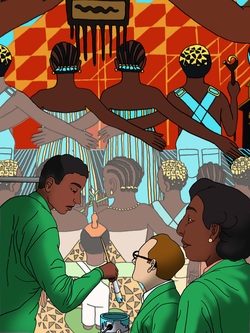 On Saturday, April 13th at 2:00pm Theater J and The Phillips Collection will present a staged reading of THE HAMPTON YEARS. Directed by Shirley Serotsky with dramaturgy by Otis Cortez Ramsey-Zoe, the reading will feature Peter Birkenhead, Edward Christian, Sarah Douglas, Crashonda Edwards, Lolita-Marie, Julian Elijah Martinez, Colin Smith, and David Lamont Wilson and will be followed by a post show discussion. Set at Virginia’s Hampton University during World War II, THE HAMPTON YEARS explores the development of African American artists John Biggers and Samella Lewis under the tutelage of Austrian Jewish refugee painter and educator Viktor Lowenfeld. Here is your opportunity to be part of the artistic process, by attending a reading of a new play in development that will have its world premiere at Theater J on May 29. The Phillips Collection's Director of Communication, Ann Greer joins director Shirley Serotsky, dramaturg Otis Cortez Ramsey-Zoe, and myself for a post-show discussion following the performance. The Phillips Collection is located at 1600 21st Street, NW Washington, DC 20009. Tickets to the reading will be included with the cost of museum admission. Click here to learn more and here for directions. Meet the Artistic Team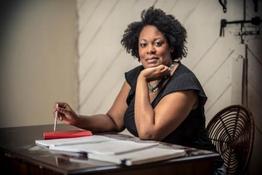 JACQUELINE E. LAWTON received her MFA from the University of Texas at Austin, where she was a James A. Michener Fellow. Her plays include Anna K; Blood-bound and Tongue-tied; Deep Belly Beautiful; The Devil’s Sweet Water;The Hampton Years; Ira Aldridge: the African Roscius; Lions of Industry, Mothers of Invention; Love Brothers Serenade, Mad Breed and Our Man Beverly Snow. She has received commissions from Active Cultures Theater, Discovery Theater, National Portrait Gallery, National Museum of American History, Round House Theatre and Theater J. Her play, Cinder Blocks, was published in Experiments in a Jazz Aesthetic: Art, Activism, Academia, and the Austin Project (University of Texas Press). A 2012 TCG Young Leaders of Color, she has been nominated for the Wendy Wasserstein Prize and a PONY Fellowship from the Lark New Play Development Center. In 2012, she was named one of 30 of the nation's leading black playwrights by Arena Stage’s American Voices New Play Institute. She resides in Washington, D.C. and is a proud member of the Dramatist Guild of America. 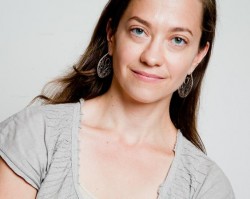 SHIRLEY SEROTSKY (Director) is the Associate Artistic Director at Theater J, where she directed the 2010 production of Mikveh, the 2009 production of The Rise and Fall of Annie Hall (which received a 2009 Helen Hayes Nomination for Best New Play), and the 2011 production of The History of Invulnerability. She began her theater education as a performance major in the musical theater program at the University of Michigan, but soon detoured into directing which she studied at the North Carolina School of the Arts. After graduation she moved to New York, where she worked at the Women’s Project and Productions; interned for the Cherry Lane Theater; and was employed as an editorial assistant for a Jewish organization. In August 2001 she moved to Washington, DC to fulfill a nine-month Kenan Fellowship at the John F. Kennedy Center for the Arts. There she worked as an assistant director and dramaturg on several productions. Since 2002 she has worked as a freelance director and dramaturg in the Washington, DC area and beyond, directing for the Source Festival, Theater Alliance, Catalyst Theater, Rorschach Theater, Catholic University, the National Conservatory of Dramatic Arts, Journeymen Theater, and on several out-of-town productions, including at the Humana Festival of New Plays at Actors Theater of Louisville. She has taught young people and adults at The Actor’s Center, the Musical Theater Center, and Theater Lab. She co-founded Bouncing Ball Theatrical Productions with Shawn Northrip (which aims to develop and produce new and innovative musical theater works). Training: BFA, North Carolina School of the Arts. Member of The 2002 Designer/Director Workshop with Ming Cho Lee and the 2003 Lincoln Center Director's Lab. 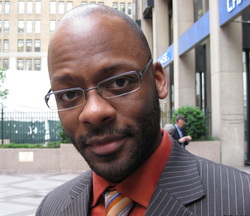 OTIS CORTEZ RAMSEY-ZOE (Dramaturg) is a Lecturer of Theatre Arts at Howard University, Future Classics Program Coordinator at The Classical Theatre of Harlem, Series Editor for NoPassport Press’s Dreaming the Americas Series, a freelance dramaturg, and a Company Member of banished? productions. He has developed new works with such organizations as The Sundance Institute, Kennedy Center, Arena Stage, Centerstage and Black Women Playwrights’ Group and by such writers as Colman Domingo, Tarell McCraney, Noah Haidle, Kirsten Greenidge and Tim Acito. He has directed readings including Jacqueline E. Lawton’s The Hampton Years and Blood-bound and Tongue-tied, James Webb’s The Contract and David Emerson Toney’s Kingdom. Previously, he was Literary Manager and First Look Coordinator at Centerstage and an Allen Lee Hughes Dramaturgy and Literary Senior Fellow at Arena Stage. Mr. Ramsey-Zöe holds degrees from New York University and the University of Notre Dame. Meet the Cast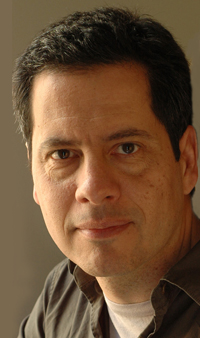 PETER BIRKENHEAD (Viktor Lowenfeld) was last seen on stage at Theater J in Mamet’s Speed the Plow. As a writer, Peter is a regular contributor to Salon.com, where he does cultural criticism, and has been published in GQ Magazine, HoBo Magazine, Marie Claire, The Chicago Tribune , and The Los Angeles Times, among other publications. His play Gonville was performed at Ensemble Studio Theater in New York, Theater J in Washington D.C., and Theater 150 in Ojai, Ca. As an actor, his credits include: Broadway: Brighton Beach Memoirs, Broadway Bound, and Laughter on the 23rd Floor. National Tours: Brighton Beach Memoir, Biloxi Blues, Broadway Bound and Angels in America. Off Broadway: The Motel Plays and Love; Yearning, Driving Lessons Regional Theater The Substance of Fire (Dallas Theater Center); The Real Thing (Stage West); A Christmas Carol (McCarter Theater); Prelude to a Kiss (Philadelphia Theater Co.); Ghosts (Portland Stage); Only Kidding; Conversations With My Father (Cleveland Playhouse); Oh, The Innocents; The Closer; What is Art?; Barbecue in 29 Palms; (GeVa Theater) The Not-For-Profits (Ojai Playwright’s Conference) Television: “House;” “NCIS;” “Gray’s Anatomy;” “Crossing Jordan;” “Six Feet Under;” “The West Wing;” “The Guardian;” “ER;” “Judging Amy;” “Jesse;” “Ally McBeal;” “NYPD Blue;” “Law and Order;” “You’re The One;” “Becker;” “Brooklyn South;” “Chicago Hope;” “Family Law;” “Profiler” and “Murder One.” 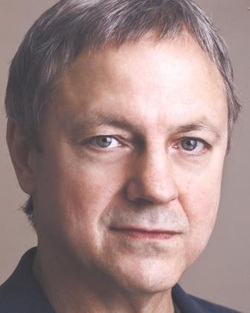 EDWARD CHRISTIAN (President Bridgman and New York Art Critic) recently appeared in the Folger Theatre's The Taming of the Shrew. Other regional credits include Forum Theatre: The Language Archive. He's also performed extensively with Perseverance Theatre: This Wonderful Life, Doubt, How I Learned To Drive, Hamlet, The Tempest, Macbeth, The Laramie Project, Twelfth Night, Much Ado About Nothing, A Streetcar Named Desire, Hedda Gabler, The Cherry Orchard, The People’s Temple, Equus, The Crucible, The Waiting Room, The Rocky Horror Show, Blithe Spirit, and As You Like It. Upcoming productions include: Henry V at Folger Theatre and The Hampton Years at Theater J. www.edwardchristian.com  SARAH DOUGLAS (Margaret Lowenfeld) is an actress, teaching artist, and therapeutic theatre facilitator. She received her MFA from The American Repertory Theatre/Moscow Art Theatre School’s Institute for Advanced Theatre Training at Harvard University. In New York City, she was a lead artist and the Artistic Producer of The Mud/Bone Collective theatre company, and developed Impossible Country, a performance project that focused on the under-told stories of an asylum seekers currently living in New York City. Her credits include: The Public Theatre, Walkerspace, Studio 54, The Ontological theatre, The Vineyard Theatre, University Settlement, Studio 889, and Theatre Trouve. Following her recent move to the DC area, Sarah played the role of Lydia in the Hub Theatre’s production of Big Love. She is delighted to be a part of the world premier of The Hampton Years, at Theatre J.  CRASHONDA EDWARDS (Samella Lewis) most recently appeared as Castabella in The Atheist Tragedy and Marianna in All’s Well that End’s Well at the Shakespeare Theatre Company and George Washington University’s Academy for Classical Acting program’s repertory showcase. At the age of 17, she was accepted to the prestigious North Carolina School of the Arts high school. Upon graduation, she pursued a BFA at Savannah College of Art and Design and during the summer studied at the New York Theatre Intensive. Following graduation, she went on to pursue her MFA at Shakespeare Theatre Company and George Washington University’s Academy for Classical Acting program. With an abundance of talent, drive, faith and skill, the next chapter of her life is sure to inspire. 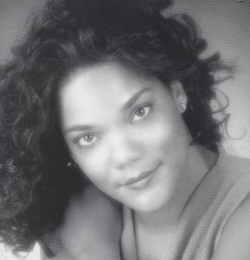 LOLITA-MARIE (Elizabeth Catlett) There is only sweet nostalgic joy in being a part of The Hampton Years. Lolita-Marie was born and raised in the Hampton Roads area. Her son Brandon, along with many family and friends are proud to have been a part of the Hampton University collegiate family over the years. Recent acting credits include: Hard Bargain Players: Hoodoo Love, The Colonial Players: Going to St. Ives, Constellation Theater: Blood Wedding, Elden Street Players: Ain’t Misbehavin, Port City Playhouse: No Niggers, No Jews, No Dogs, andTheater J: Something You Did. For a full resume please visit www.lolitamarie.com. 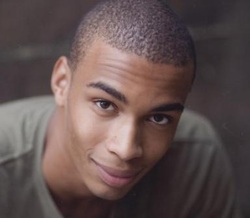 JULIAN ELIJAH MARTINEZ (John Biggers) is a teaching artist based in Washington DC and a graduate of Elon University. DC Credits include: Locomotion (John F. Kennedy Center); Jekyll and Hyde (Synetic Theater Company); Romeo and Juliet, Pride and Prejudice, Cymbeline, and A Midsummer Nights Dream (Chesapeake Shakespeare Company); and Lyme Park (the Hegria). Regional Credits include: Hamlet and All's Well That Ends Well (Orlando Shakespeare Theater) and Man of La Mancha (Hangar Theater). Elijah would like to thank Theater J for the opportunity to play and perform with them, and is infinitely proud of this amazing cast. julianelijahmartinez.com 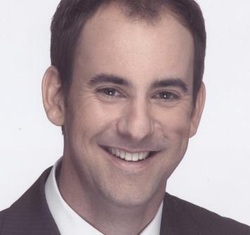 COLIN SMITH (President Malcolm McLean and Southern Admiral) has appeared at Theatre J as the understudy for Crick in Photograph51. He is a company member with Keegan Theatre where his acting credits include: August Osage County (Bill), Spring Awakening (Swing), Twelve Angry Men (Juror 8), The Crucible (Reverend Paris; Ireland/US), Noises Off (Tim), The Graduate (Mr. Robinson), Dancing at Lughnasa (Michael), Translations (Manus; Helen Hayes nomination-outstanding ensemble), Glengarry Glen Ross (Williamson; Ireland/US) and others. Other D.C. credits include productions with The Washington Shakespeare Company, Forum Theatre, American Century Theatre, Charter Theatre and Journeyman Theatre. His directing credits include Laughter on the 23rd Floor (Keegan Theatre) and Fool for Love (Keegan Theatre; Ireland/US). Colin is a graduate of St. John’s College, The National Conservatory of Dramatic Arts and The Actors Repertory Theatre. 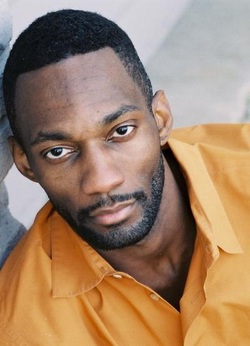 DAVID LAMONT WILSON (Charles White) is thrilled to have the privilege of working on this exciting new work by Jacqueline Lawton. Mr. Wilson was last seen performing Factory 449’s Washington premier of “The Saint Plays” and “All That Glitters” for Restoration Stage. Favorite productions include roles in the critically acclaimed Charter Theatre production of “Am I Black Enough Yet?”, “The Oedipus Plays” at The Shakespeare Theatre, “Heaven” and “Big Love” for the Woolly Mammoth Theatre Company, “American Buffalo”, “Inns & Outs” and “Edmond” at Source Theatre; “Invisible Disability” and “The Boy Who Walked Backwards” at the Kennedy Center; and the European Tours of “The Cutting Edge” for Imagination Stage and “Julie” for Scena Theatre. His resume also includes productions at Arena Stage, Olney Theatre, and the Folger Shakespeare Theatre, as well as a featured role on NBC's award winning Homicide: Life On the Streets and HBO's The Wire. He is currently shooting the new independent film “Flesh To Flesh” by Lee Hayes, and can be seen later this season in “The Saint Plays” for Factory 449. David would like to thank Daniel Wallace for bringing additional sunshine into his existence!  The Phillips Collection is an "intimate museum combined with an experiment station."–Duncan Phillips, 1926. The Phillips Collection is an exceptional collection of modern and contemporary art in a dynamic environment for collaboration, innovation, engagement with the world, scholarship, and new forms of public participation.
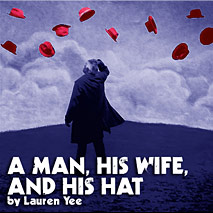 Jacqueline Lawton: Why did you decide to get into theatre? Was there someone or a particular show that inspired you? LAUREN YEE: When I was six, I distinctly remember telling my father that I wanted to be a starving artist. Nowadays, that hopefully won't be the case, but basically I always wanted to be a writer. It was in high school, however, that I zeroed in on playwriting as the right medium for me. I'm someone who loves dialogue. My strength as a writer comes from my ear for hearing language and how people speak. Playwriting allowed me to take advantage of that, and gave me the chance to write for people and with a sense of immediacy. Plays become tangible when there are other actors in the room; this made the whole process of writing seem so much less lonely and more urgent. JL: Next, tell me a little bit about your writing process. Do you have any writing rituals? Do you write in the same place or in different places? LY: My writing can be messy, haphazard, and sprawling. It makes sense to me then that I very much like to control my writing habits and environment. I like certainty and sameness and good conditions when I write in a slightly OCD kind of way; I am one of those people who can't write if the height of the table is too high or the temperature is off. I also like trapping myself in a coffee shop. If I've paid two bucks for a tea, I will probably not stop working until I get my two dollars' worth of writing time in. Also, coffee shops give me that white noise in the background that helps me concentrate (whereas I know some people can't stand it). It's helpful for me to imagine my writing self as a small, unpredictable, sometimes unreasonable pet that I'm responsible for and need to cater to. For instance, some days my writing self wants to sit for six hours straight working. And some days it just needs a burrito. And I just try not to get in the way of it. JL: Describe for me all the sensations you had the first time you had one of your plays produced and you sat in the audience while it was performed...what was different about the characters you created? How much input did you have in the directing of that work? LY: In the very beginning, I had a 10-minute piece that was being performed about an hour outside of where I lived at the time. I basically came for opening night, watched my piece, and just kind of held my breath the entire time. )I get anxious about where people will laugh, if they're listening.) Since then, the process has roughly been the same. Many of my productions have been out of town, and I am rarely around for the entire rehearsal process. Typically, I may be around for the beginning of rehearsals and then return for final dress and tech, so I'm coming back to a piece as it's close to being completely open and running. Honestly, I enjoy being surprised at what comes out. In graduate school, I was able to be heavily involved in the design and rehearsal process for my work, but obviously that's a luxury that you don't always get to have. If your work has a life beyond the initial production, most likely you will have to let go of a fair amount. As far as playwrights go, I think I'm fairly good at giving the director and actors room to explore, namely because I personally would be a horrible director and really wouldn't have better ideas about how they "should" be approaching the play. For that reason (among others), I have immense respect for what directors do and how much of themselves they put into the process. JL: What do you hope to convey in the plays that you create--what are they about? What sorts of people, situation, circumstances, do you like to write about? LY: I love comedy from a sideways, unexpected angle. I believe that pain and humor go hand in hand, and that a play should run the gamut of emotions. I want a play that makes me laugh, makes me feel, teaches me something new, makes me view the world in a new light. I like plays with a lot of stuff in them. I also tend to write a lot of brother-sister relationships. I have two younger brothers, and that kind of dynamic has weaseled its way into my writing. My much younger self would probably be annoyed at this. Pregnant women and babies also magically show up in a lot of my plays. Not because I've had a kid yet and not because being pregnant is the only state that makes a female character interesting, but because the whole process of making a new human being and the choices and tradeoffs involved have always seemed to reveal exciting, desperate things, horrifying and/or rewarding things about who we are as human beings. JL: Tell us about A MAN, HIS WIFE AND HIS HAT and what inspired you to write it. LY: Three years ago, I went to a writers residency along Egypt's Red Sea. They housed the writers at a German-owned golf resort. (I woke up to rich Europeans and Egyptians teeing off outside my window.) Everyone there had an accent (me included) and the only two channels I could get in English were the History Channel (which played WWII documentaries) and the international (read: less good) version of CNN. I was interested in the idea of narration and storytelling, and I'd always thought the title of Oliver Sacks's neurology book THE MAN WHO MISTOOK HIS WIFE FOR A HAT would always been a good jumping off point for a play. (An earlier temporary title for this play was THE MAN WHO MISTOOK HIS WIFE FOR GRANTED.) It was in this environment that I came up with the play. JL: The HUB Theatre did a reading of A MAN, HIS WIFE AND HIS HAT last year. What did you learn from that experience? Has the play grown or changed since then? LY: Once again, I wasn't able to get down to the D.C. area when the Hub did the reading of my play, but I heard it went well! And it was really exciting to hear that they wanted to do a production of the play, because I actually hadn't met anyone from the Hub Theatre yet and it's so rare that a theater chooses to produce a play without knowing the playwright at all. I've done some small tweaks on the play since then. JL: What do you hope audiences are thinking about after experiencing A MAN, HIS WIFE AND HIS HAT? LY: To me, this play is about the idiosyncrasies of relationships, particularly long-standing ones. My grandparents were married for over sixty years, and I remember feeling that for them, love had morphed somewhere along the way. It wasn't all about romantic gesture. Making the bed together or correctly parking the car was just as important. I find relationships as they age simultaneously disconcerting, hilarious, and beautiful. I also hope that this play expands the form a little bit and challenges people to think in big, bold ways about what can be put on stage. I like to give audiences something that hasn't been done before with the form (or at least something that hasn't been done too often). JL: What advice do you have for up-and-coming playwrights? LY: Find your tribe. Be nice, or at least be the kind of person that other people might not mind spending time in a room with. Caffeinate. Be okay with the fact that most of what you write will not be good, will be discarded, will probably never been read or heard or seen by anyone but you. Know which theaters fit you as a playwright. Be rigorous in applying for things. Experience storytelling in different forms (books, podcasts, graphic novels, etc). JL: What’s next for you as a playwright? Where can we follow your work? LY: I'm on Facebook (so come find me!), and like everyone else, I figured out how to get a website up and running (www.laurenyee.com). I'm currently living in New York and I'm a member of Women's Project Lab and the Ma-Yi Writers' Lab, so I occasionally pop up with stuff there. I just had a run of shows this spring, so the next concrete productions I have lined up are a group show with the Women's Project Lab (spring 2014) and show with Encore Theatre Company in San Francisco (winter 2015). Also currently working on a new commission for Lincoln Center Theatre/LCT3, so plenty busy! 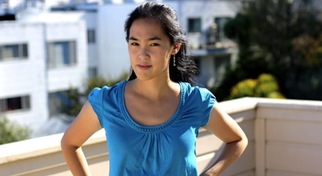 LAUREN YEE was born and raised in San Francisco, and received her bachelor’s degree from Yale University. Her full-length play CHING CHONG CHINAMANwas a finalist for the 2008 Princess Grace Award and the winner of the Kennedy Center American College Theater Festival’s 2010 Paula Vogel Award, and Kumu Kahua Theatre’s 2007 Pacific Rim Prize, and was named one of the top 10 plays of the year by the East Bay Express and City Pages. A MAN, HIS WIFE, AND HIS HAT was developed at PlayPenn and UCSD’s Baldwin New Play Festival, produced at AlterTheater, and received its San Diego premiere at Moxie Theatre in the spring. The Bay Area Playwrights Festival, AlterTheater, the O’Neill Studio at Yale, and PlayGround have previously commissioned her work. She is currently working on new commissions for the Kennedy Center and Mu Performing Arts (with support from the MAP Fund). 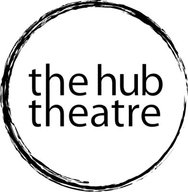 The Hub Theatre is an award winning, professional non-profit theatre making its home in Fairfax County, Virginia. The Hub Theatre is a member Theatre Washington. The Hub has received grants from Target, the Fink Foundation, the Arts Council of Fairfax, The Friends of Lake Anne, Virginia Commission for the Arts, the Arts Council of Fairfax, Integrity Applications, and Booz Allen Hamilton. Mission The Hub Theatre endeavors to produce work that highlights our common humanity, providing a theatrical experience that is at once challenging and inclusive. We strive to be the physical center of a dynamic circle of story, art, and community, to create the transcendent exchange unique to live theatre. |
My BlogI'm a playwright, dramaturg, and teaching artist. It is here where you'll find my queries and musings on life, theater and the world. My posts advocate for diversity, inclusion, and equity in the American Theatre and updates on my own work. Please enjoy!
Categories
All
Archives
June 2020
Reading List
|
